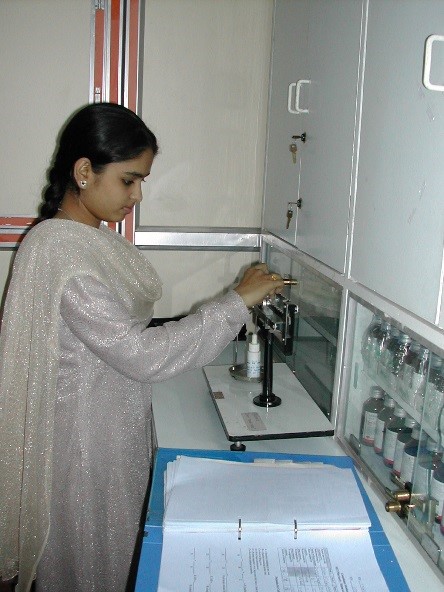Up Close: Sadaf Inamdar
The integrity of clinical trials relies on pharmacological expertise, precise management skills, and the ability to devise and apply creative approaches. Sadaf Inamdar, Pharmacist of Record for the BJGMC Clinical Research Site and the JHU-BJGMC research partnership, leads the pharmacy team’s efforts at BJGMC in Pune, where she is currently working on 5 trials, and preparing for 3 more to begin.
In 2001 Hopkins investigational pharmacist Dr. Vivian Rexroad was interviewing candidates to build pharmacy capacity for the India arm of the Six Week Extended-Dose Nevirapine (SWEN) Study. Sadaf Inamdar stood out among the many people interviewing for the study pharmacist position. “When Sadaf arrived for her interview, I quickly realized she was who we needed.” Rexroad recalled. “She was a new graduate from a pharmacy school that did not have a clinical track in their program so she had no clinical experience working with patients. But she was smart, energetic, interested, and ready to learn. So Sadaf, another young pharmacy graduate, and I set up the Research Pharmacy at BJMC. In that tiny pharmacy, they successfully completed the study which was responsible for changing WHO guidelines on nevirapine use.”
Ms. Inamdar has been with the clinical trials unit at BJGMC ever since, and in 2013, she joined the Johns Hopkins India team as Pharmacist of Record. “For 15 years, I have worked on many different studies involving HIV and tuberculosis treatment strategies for adults and children. It is definitely interesting to know different study drugs and formulations, new treatment regimens and their outcomes, and ultimately maintaining a participant friendly environment. These are the most interesting aspects of my job.”

Sadaf Inamdar, 2002. Photo
courtesy of Dr. Vivian Rexroad.
Inamdar’s role in HIV and tuberculosis research is high-stakes and involves a wide variety of responsibilities. In the planning stages of any study, she determines treatment dosing strategy, acquires medications from manufacturers, and navigates the complex world of government import approvals. On site, she is charged with study product management, and she oversees the work of the team that prepares, delivers, and dispenses medications to participants at scheduled clinic visits. She also is responsible for quality control and quality assurance, and monitoring reports and site visits. “My work ensures safe handling of investigational drugs and making sure that the participants are provided with sufficient training on study treatment. Better adherence to treatment is the ultimate goal, so we are able to get quality data for analysis.”
An integral part of participant adherence to treatment is understanding life challenges participants face, and working with them to make treatment less burdensome. Many people are illiterate; many consider treatment to be hopeless; many never tell their families of their health status because of the stigma involved. She remembers a participant who arrived in the clinic depressed. In counseling it was discovered that his family and coworkers had found out about his HIV status, and were distancing themselves from him—going so far as to cut off communication. Feeling ostracized and isolated, he discontinued HIV therapy. Through intensive counseling, the participant became more empowered to take control of his health. “He started taking study medications on time without missing a single dose,” Inamdar said. “Now when I see his adherence to the study treatment, you will not believe, it is 100% at every visit. He feels thankful to us and is doing very well on the study.”
In another instance, a participant was reluctant to take home a 3-month supply of study meds due to fear that her in-laws would discover her status. So the pharmacy team devised a tailored strategy in which she would visit the clinic more often, and take home fewer meds, which were easier to conceal. Inamdar works at the nexus of pharmacology, clinical practice, and patient management, and she expertly balances the roles required. “Our work is not only dispensing medications and imparting training but also to identify the issues, whether social or personal, that affect being adherent to the study treatment. We want the participant to understand why it is important for their own health, ultimately making the study treatment beneficial and successful. The success of any clinical trial depends majorly on the study drug treatment success. So being an important part of it is really very interesting.”
